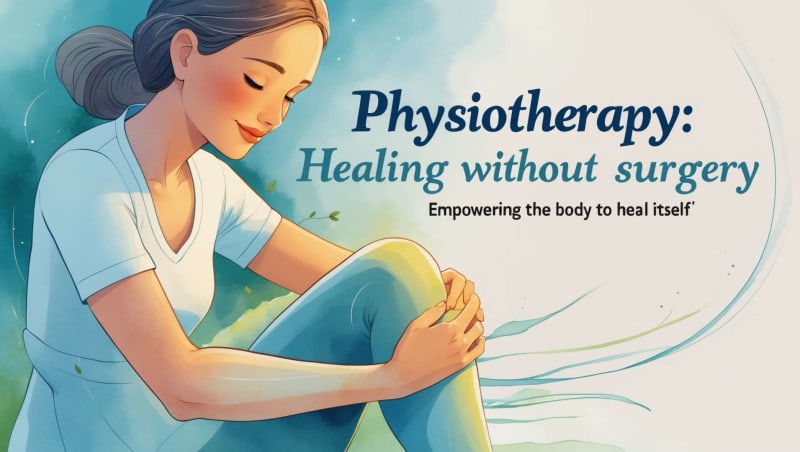Physiotherapy is a clinically proven, non-invasive treatment approach that aids in healing, restores functionality, and prevents surgery in many cases. It targets the root cause of pain and dysfunction through personalized therapeutic exercises, manual techniques, and advanced modalities. By improving strength, mobility, and tissue recovery, physiotherapy empowers the body to repair itself naturally, reducing dependency on surgical intervention. For those seeking professional guidance in their recovery journey, working with the best physiotherapist in Rawalpindi ensures a customized and highly effective treatment plan.
Surgical procedures often become necessary when conditions are left untreated or progress due to poor management. However, with early physiotherapy intervention, we can treat various orthopedic, neurological, and musculoskeletal conditions conservatively. Physiotherapists assess movement dysfunction, identify imbalances, and implement evidence-based treatment plans to facilitate healing from within. Patients suffering from disc bulges, meniscal injuries, tendonitis, and early-stage arthritis frequently avoid surgery with consistent, targeted therapy.
In cases where mobility is limited or the pain is severe, patients benefit from physiotherapy home service Rawalpindi, ensuring access to expert care without the physical stress of clinic visits. This continuity of care at home allows for proper progression of treatment, essential for avoiding escalation to surgical options.
Back and neck problems are among the most common reasons for orthopedic surgeries. Herniated discs, spinal stenosis, and chronic sciatica are conditions that often lead to surgical recommendations. However, physiotherapy can decompress the spine, reduce nerve irritation, and restore spinal alignment through techniques like traction therapy, core stabilization, McKenzie exercises, and posture correction.
Osteoarthritis and rheumatoid arthritis can severely affect the knees, hips, and shoulders, often leading to joint replacement recommendations. Physiotherapy delays or eliminates this need by improving joint mechanics, reducing inflammation, and strengthening surrounding muscles. Manual therapy, low-impact aerobic conditioning, and neuromuscular re-education are powerful tools in slowing joint deterioration and managing pain without drugs or operations.
Injuries such as ACL tears, rotator cuff strains, or Achilles tendinopathy don’t always require surgical repair. Physiotherapy enhances natural healing through eccentric loading exercises, soft tissue mobilization, and progressive strength training. Gradual rehabilitation improves tissue tolerance, reduces pain, and restores function without surgical risks. Proper guidance during this healing window is crucial in avoiding permanent instability or re-injury.
Prolonged immobilization following fractures or surgeries can lead to joint stiffness, muscle atrophy, and poor circulation. Physiotherapists assist in regaining full range of motion and muscular endurance through controlled mobilization techniques. This minimizes the risk of post-fracture complications and prevents the need for corrective surgical procedures down the line.
Stroke survivors, patients with Parkinson’s disease, and those suffering from peripheral neuropathies often experience physical decline that may suggest surgical intervention. Physiotherapy helps restore balance, motor control, and neuromuscular coordination through neuro-rehabilitation techniques such as proprioceptive training, gait re-education, and functional task exercises. These strategies reduce fall risks and enhance daily independence.
Athletes frequently experience ligament sprains, muscle tears, and overuse injuries. With sports-specific physiotherapy, we implement biomechanical corrections, soft tissue recovery techniques, and graded strength programs to promote a safe and complete return to activity without the need for surgical intervention. Preventative strategies also reduce the risk of recurring injuries.
When surgery is absolutely necessary, physiotherapy still plays a role in “prehabilitation” a proactive approach to prepare the body for surgery. This enhances surgical outcomes by strengthening supportive tissues, improving circulation, and educating patients on post-operative care. Studies show that pre-surgical physiotherapy reduces recovery time and complications significantly.
Surgery should never be the first or only option considered when managing physical health. Physiotherapy offers a structured, safe, and evidence-based alternative that supports the body’s natural ability to recover. From chronic pain to acute injury, early intervention by a qualified physiotherapist not only reduces the need for surgery but also promotes long-term health, strength, and independence. Choosing the right physiotherapy partner is the first step toward healing naturally and effectively.
